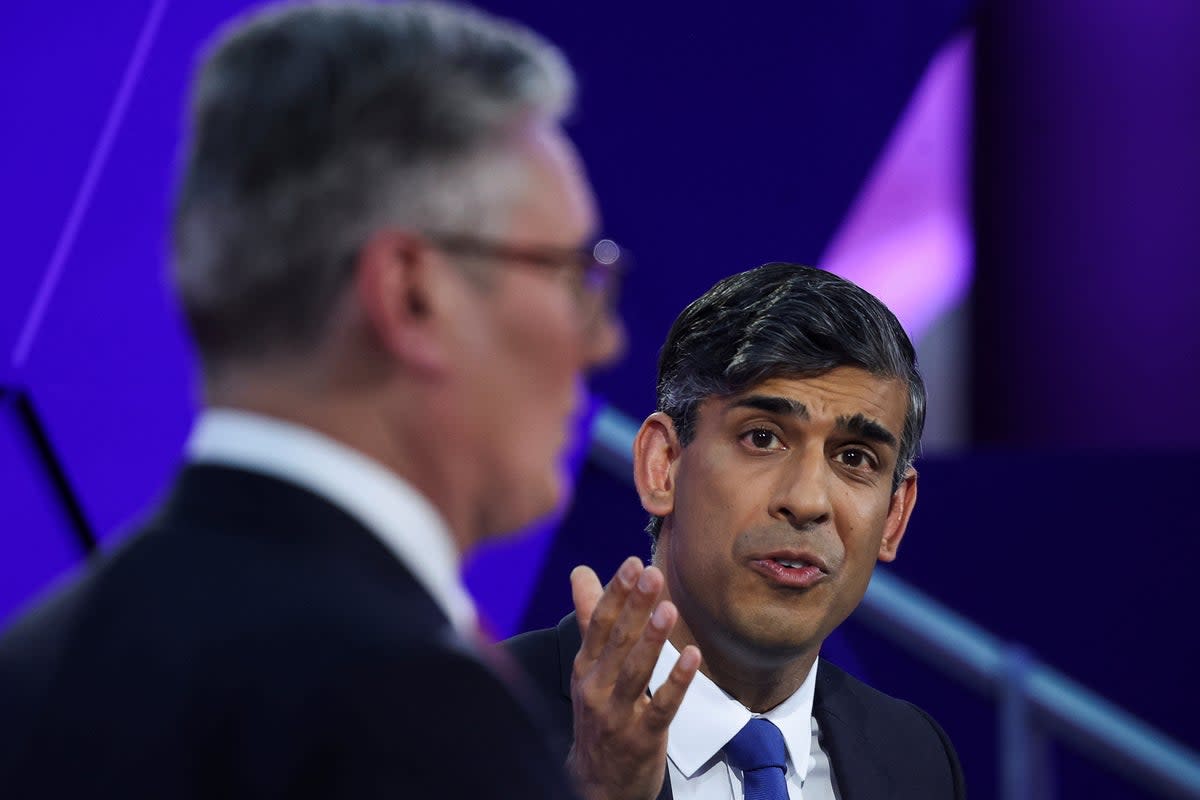What is a ‘supermajority’ – and could Labour secure one at the general election?

- Oops!Something went wrong.Please try again later.
- Oops!Something went wrong.Please try again later.
Rishi Sunak has warned voters against enabling a Labour ‘supermajority’ at the general election on Thursday as his party continues to lag behind in the polls.
The prime minister tested out the new line on the campaign trail in the run-up to polling day in a decidedly defensive move against Sir Keir Starmer’s Labour Party.
“The outcome of this election is not a foregone conclusion,” said Mr Sunak. “If just 130,000 people switch their vote and lend us their support, we can deny Starmer that supermajority.
“Just think about that: you have the power to use your vote to prevent an unchecked Labour government.”

In making this warning, the prime minister doubtless has in mind his party’s position in the polls. Most experts are putting Conservatives an average of 20 points behind Labour, with the gap only widening since the general election was called.
Some worst-case projections for the Tories see the party gaining as few as 120 seats. This would be a drop of 245 from 2019, and mark the party’s worst-ever result.
Meanwhile, Labour could win as many as 420 seats, up by 217 and far exceeding the 326 needed for a majority. This would give them a majority of 190.
This would even pip Labour’s 1997 result under Tony Blair when the party won 419 seats and secured a majority of 179, a figure that remains the record high for any political party.
If these predictions become reality, it would certainly be a very large majority for Labour – but is the prime minister right in warning of a ‘supermajority’?
Here’s everything you need to know about the term and what it could mean for UK politics.
What is a supermajority?
The term ‘supermajority’ is most typically used in reference to US politics. This is because it is a crucial part of the US federal system, where a supermajority refers to a qualified majority of two-thirds.
In the US Congress a supermajority vote is needed for some major legislative actions, such as removing an impeached president from office, declaring a president incapable of serving, or amending the constitution.
It is slightly different for the Senate, where a majority of 60 per cent (meaning 60 of the 100 members) is needed to close a debate or bill without interference from minority members.
However, actually achieving these numbers is exceedingly rare, meaning bargains often need to be made. The last time any party enjoyed a supermajority in Congress was in 1965, when the Democrats under Lyndon B. Johnson had a majority of 68 per cent.

Could we get a supermajority in the UK?
If considering just the technical definition of the term, the concept of a supermajority does not apply to UK parliament.
The governing party in the country will generally be whichever won a majority of seats at the general election. If no party gains a majority, it is a hung parliament and the leader can either form a minority government or strike a deal with another party to push them over the line. This is what happened after both the 2010 and 2017 general elections.
To pass legislation in the House of Commons, 50 per cent of MPs (plus one) need to vote on legislation for it to pass. This means the governing party is rarely defeated when attempting to pass a bill. The last time a government bill was outvoted in its final stage was 1977.
“In parliamentary terms, the difference between an 80-seat and 200-seat majority is not material,” writes Institute for Government director Dr Hannah White.
“The most significant factor for democracy is the attitude a government takes to the role of parliament and the value of scrutiny.”
It is this last point that Mr Sunak may have been alluding to more in his campaigning. In parliament, a key scrutiny measure comes from select committees, cross-party groups of backbench MPs will will hold the government to account on specific issues.
The chairs and members of these committees will be distributed based on the strength of each party in parliament. If Labour holds a record majority, they will have more of their own members holding them to account.
Another factor likely hanging over the prime minister is the reduction of funds allocated to parties with fewer seats. ‘Short money’ is given to opposition parties with either two seats of more than 150,000 votes in one seat.
These parties will receive £21,438 a year for every seat they win, plus £42.82 for every 200 votes and a portion of travel expenses. The leader of the opposition’s office also gets an annual £998,817.
However, none of this is much different to the situation Labour and smaller parties face currently. Experts have generally criticised Mr Sunak for stoking fears of a ‘supermajority,’ pointing out that it would simply be a similar scenario to the circumstances his party has enjoyed for the last 14 years.

